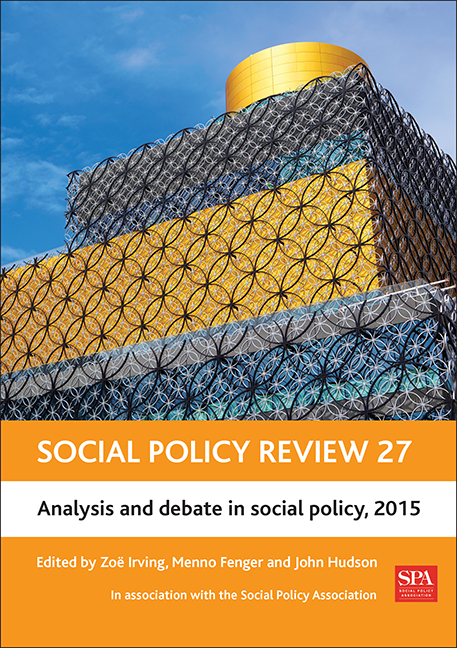Book contents
three - Responsibilisation of everyday life: housing and welfare state change
Published online by Cambridge University Press: 08 March 2022
Summary
Introduction
In this chapter we focus on the unfolding narrative of social change instigated through ‘housing’ and its central connection to welfare reform. We couch this commentary in terms of two closely related concepts – ‘responsibilisation’ and ‘financialisation’ – both of these implying that citizenship in 21st-century UK is defined largely in terms of individuality, risk-taking and self-management. These concepts have been associated with homeownership, but are now surfacing in social housing too, dramatically illustrated in the period under consideration in this review. Our central argument is that housing, for a long time marginal to key debates about welfare state change, is now at the forefront of welfare reform and the wider reconstitution of 21st-century welfare states. The idea behind this chapter is to show in detail how ‘housing’ has an impact on and through institutional structures, and how the discourse around ‘responsibilisation’ and ‘financialisation’ is increasingly common ground in both the owner-occupier and social housing sectors, that these concepts bleed across what were once thought of as discrete housing tenures. In this chapter we use what might appear to be two very disparate examples – the rise of asset-based welfare very largely derived from housing equity and re-mortgaging, and the interface between the welfare reform agenda and social housing. What binds them together is the increasingly shared discipline of a welfare system that preaches freedom, responsibility and self-provisioning, but in the context of rules and institutional structures that citizen-consumers do not control. In the realm of ‘everyday life’, households behind their front doors are faced with decisions about how to react to sometimes very stark choices regarding their welfare needs, often risking financial insecurity, and always with a lonely burden of responsibility. Housing and home is the place, but increasingly also at the centre of the process through which household budgets shape decision-making on welfare needs.
Even the most casual political observer would appreciate that ‘responsibility’ has been a buzzword in British political discourse surrounding UK welfare reform. From the Third Way's central tenet of ‘no rights without responsibilities’ (Dwyer, 2004, p 265) to the coalition government's fostering of ‘social responsibility’ through the ‘Big Society’ (Ellison, 2011, p 55; Bulley and Bulley, 2014, p 455), a focus on the changing boundaries of individual responsibility for welfare or life outcomes has provided ample fuel for rhetoric and policy-making throughout successive governments.
- Type
- Chapter
- Information
- Social Policy Review 27 , pp. 55 - 72Publisher: Bristol University PressPrint publication year: 2015
- 1
- Cited by



